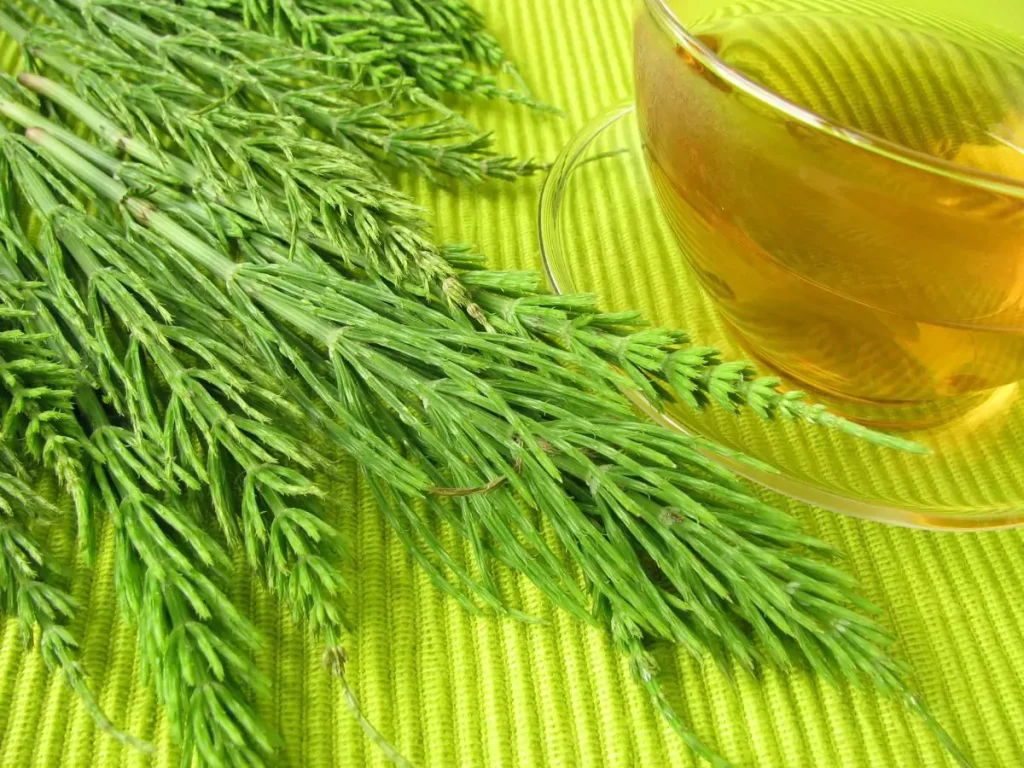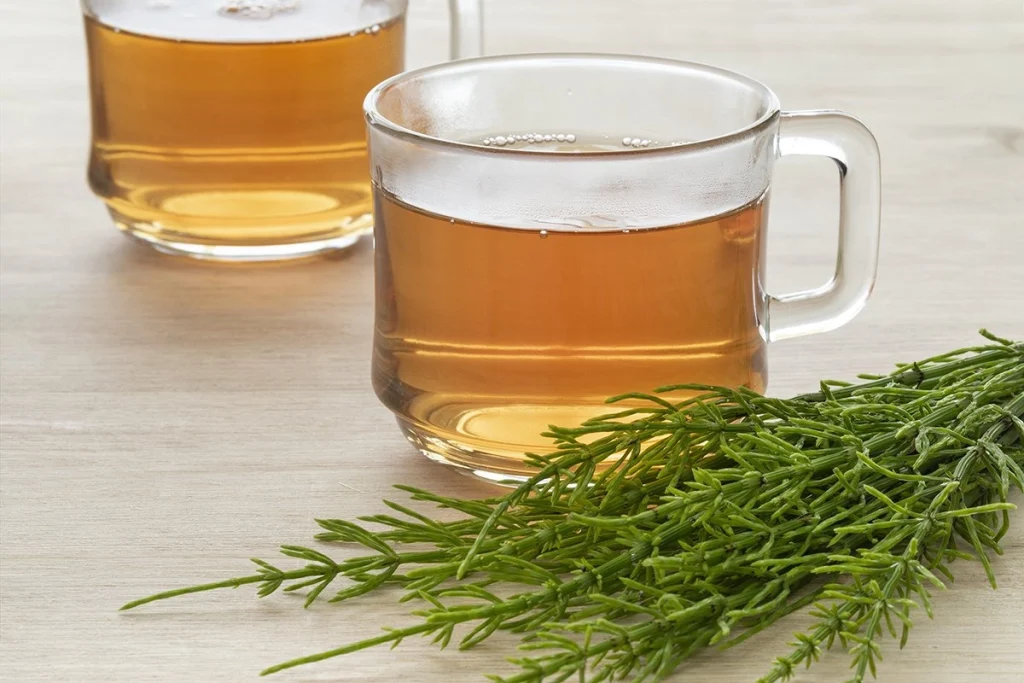Horsetail Tea Benefits & Side Effects telefon numarası, müşteri hizmetleri ve adres bilgilerine hızlı ulaşmak isterseniz aşağıdaki makalemizi okumanızı tavsiye ederiz.
The extraordinary health advantages of horsetail tea, a herbal powerhouse, are gaining increasing recognition in the realm of natural remedies. Derived from the perennial fern-like plant, Equisetum arvense, horsetail tea presents a plethora of benefits, establishing itself as a valuable inclusion in one’s health regimen.
From its diuretic properties aiding in the management of fluid retention and weight loss to its support for bone health, the merits of this unassuming plant are truly commendable. Moreover, it exhibits promising results in addressing more specific conditions like kidney stones and urinary tract infections, owing to its anti-inflammatory attributes.
However, as with any potent natural remedy, it is crucial to be cognizant of potential side effects. In this discourse, we shall explore the manifold benefits of horsetail tea, unraveling the scientific underpinnings of its health-promoting properties.
Table of Contents

Horsetail tea stands out for its diverse nutritional properties, offering a myriad of health benefits rooted in its rich composition. This herbal infusion is particularly noteworthy for its abundance of antioxidants, including phenolic compounds and flavonoids, renowned for their capacity to combat detrimental free radicals in the body. These antioxidants play a pivotal role in supporting overall health and mitigating the risk of various diseases, spanning from heart conditions to specific types of cancer.
A standout feature of horsetail tea is its remarkable silica content, a mineral crucial for fortifying bones and enhancing the health of hair and nails. Equisetum arvense, the plant from which the tea is derived, is uniquely high in silica, making it an optimal natural solution for those seeking to bolster bone health or address concerns related to hair and nails.
Beyond silica, horsetail tea boasts significant levels of potassium, a vital mineral recognized for its role in promoting heart health and regulating fluid balance within the body. The inherent diuretic effect of the tea, largely attributed to its potassium content, further aids in maintaining fluid equilibrium and potentially supports weight loss.
Furthermore, horsetail tea comprises an array of other essential minerals and vitamins, including manganese, calcium, iron, and vitamin C. This harmonious blend of nutrients collaborates synergistically, contributing to the holistic health advantages of horsetail tea and rendering it a valuable addition to any health-conscious diet.
For a comprehensive understanding of the benefits of horsetail tea, supported by scientific studies, please refer to the detailed information provided below.

A report from the National Health Service (NHS) sheds light on the prevalence of male pattern baldness, or androgenetic alopecia, affecting approximately 50% of men by the age of 50. Similarly, around 40% of women experience some degree of hair loss by the time they reach 70, emphasizing the significant impact of this issue on the UK population.
Horsetail tea, renowned for its remarkable silica content, has garnered recognition as a potential natural remedy for addressing hair loss. Silica, a pivotal mineral abundant in horsetail tea, plays a crucial role in fortifying hair strands, enhancing elasticity, and fostering overall hair health. Scientific studies have suggested that silica aids in strengthening hair by replenishing collagen, a vital protein responsible for maintaining hair strength and shine.
A notable 2012 study published in the Journal of Clinical and Aesthetic Dermatology focused on a specific nutritional supplement containing silica from horsetail. The study, conducted as a double-blind, placebo-controlled trial with women aged 21 to 75 experiencing thinning hair, revealed significant increases in hair density among participants who took the silica supplement compared to those receiving a placebo over the 90-day period. These findings offer compelling evidence supporting horsetail tea as a potential natural remedy for hair loss.
Beyond its role as a hair growth stimulant, horsetail tea harbors additional nutrients, including iron and vitamin C, both crucial for sustaining healthy hair growth. Iron facilitates the transport of oxygen to hair follicles, supporting their growth and strength, while vitamin C contributes to collagen production, improving hair elasticity and preventing breakage. Incorporating horsetail tea into one’s routine not only provides a potential solution for combating hair loss but also offers a holistic approach to nurturing and maintaining vibrant, healthy hair.

Tackling the Obesity Challenge: Exploring the Potential of Horsetail Tea for Weight Management
The United Kingdom grapples with a concerning rise in obesity, as recent data from NHS Digital reveals that approximately 67% of men and 60% of women in England are classified as overweight or obese. Furthermore, nearly a third of children aged 2 to 15 fall into this category. These statistics underscore the urgent need for effective weight management strategies in the UK.
Amidst this landscape, the spotlight turns to horsetail tea as a potential natural aid for weight loss. Its diuretic properties contribute to fluid balance and alleviate bloating, offering the prospect of a leaner appearance. Additionally, intriguing research suggests that horsetail may possess fat-burning capabilities. A 2017 study published in the Journal of Food Science and Technology revealed that horsetail extract had a notable impact on the metabolism of fat cells, accelerating their breakdown.
In this study, rats were divided into groups receiving either a high-fat diet or a high-fat diet supplemented with horsetail for seven weeks. The results indicated that the group consuming horsetail extract exhibited lower levels of body weight gain and reduced fat accumulation. These findings present horsetail tea as a potential ally in weight loss efforts, proposing a natural and potentially effective alternative to conventional weight-management methods.
Navigating the Path to Kidney Stone Relief: The Potential of Horsetail Tea as a Natural Remedy
Kidney stones, scientifically known as renal calculi, are rigid deposits formed from minerals and salts within the kidneys. Their development initiates when substances like calcium, oxalate, and uric acid become concentrated in the urine beyond the body’s ability to dilute them effectively.
Factors such as low fluid intake or dehydration can exacerbate the formation of kidney stones. Inadequate liquid levels hinder the washing away of these substances, leading to crystal formation. Over time, these crystals may amalgamate into larger masses known as kidney stones. While smaller stones may pass through the urinary tract unnoticed, larger ones can induce intense pain and complications.
Horsetail tea is emerging as a potential natural remedy for kidney stones, primarily due to its diuretic properties. By fostering increased urine production, this herbal infusion aids in flushing the urinary system, diminishing the concentration of substances conducive to kidney stone formation. The augmented hydration may act as a preventive measure against new stone formation and facilitate the passage of existing ones.
Furthermore, the presence of silica in horsetail tea holds promise for inhibiting stone growth, as indicated by preliminary studies. However, comprehensive clinical research is essential to fully substantiate these potential benefits.
It is crucial to underscore that while horsetail tea may contribute to kidney stone management, it should not serve as a substitute for professional medical advice or treatment. Consultation with a healthcare provider remains imperative when addressing kidney stones or any other health-related concerns.
Urinary tract infections (UTIs) pose a common challenge, affecting various components of the urinary system, such as the kidneys, bladder, ureters, and urethra. Predominantly, UTIs occur in the lower urinary tract, involving the bladder and urethra. Bacterial intrusion, typically entering through the urethra, triggers UTIs as these microorganisms multiply in the bladder.
Despite the intricate defence mechanisms of the urinary system, bacteria can occasionally breach these barriers, initiating a rapid proliferation that culminates in infection.
Women are more susceptible to UTIs than men, primarily due to anatomical distinctions—women possess a shorter urethra, diminishing the distance bacteria must traverse to reach the bladder. While UTIs bring discomfort and pain, prompt treatment with antibiotics generally resolves these infections.
In the realm of natural remedies, horsetail emerges as a potential ally in managing kidney stones. Its diuretic prowess stimulates the kidneys to enhance urine production. This heightened output aids in flushing out smaller kidney stones and curbing the formation of new ones by diminishing the concentration of stone-forming substances in the urine.
A 2021 research review delves into the broader therapeutic potential of horsetail tea, encompassing various kidney conditions like urethritis and kidney stones. While promising, these findings emphasize the imperative need for further rigorous scientific assessment to validate these potential benefits and unravel the underlying mechanisms.
Osteoporosis, a condition characterized by brittle bones, arises when the body either loses too much bone, produces insufficient bone, or experiences a combination of both factors. This renders the bones weak, making them prone to fractures from minor incidents such as a sudden movement or a slight bump. Common fracture sites include the hip, wrist, and spine.
In the United Kingdom, osteoporosis stands as a significant public health challenge. The National Osteoporosis Society estimates that over 3 million people in the UK grapple with osteoporosis, translating to approximately one in two women and one in five men over the age of 50 experiencing bone fractures, largely attributed to compromised bone health. These statistics underscore the urgency of comprehending and addressing osteoporosis as a pressing public health concern.
Horsetail tea, boasting an impressive mineral profile, emerges as a potent natural ally for individuals contending with osteoporosis. Silica, a mineral abundantly present in horsetail, assumes a pivotal role in bone formation and health. Silica facilitates the production of collagen, a crucial protein for bone strength. Augmenting the body’s silica levels through horsetail tea may contribute to enhanced bone density, potentially mitigating the risk of fractures.
Recent research sheds light on horsetail’s potential in treating bone diseases such as osteoporosis. In vitro studies indicate that horsetail holds the ability to inhibit osteoclast activity, the cells responsible for breaking down bone tissue, while concurrently promoting the production of osteoblasts, responsible for generating new bone.
This dual-action mechanism suggests that horsetail tea could be a valuable resource for fortifying bones and potentially addressing the frailty associated with osteoporosis.
While horsetail tea may offer benefits to those dealing with osteoporosis, it should not replace prescribed treatments. Consulting with a healthcare provider before initiating any new supplement regimen, particularly for individuals with existing health conditions, is crucial. Further research is imperative to comprehensively understand the impact of horsetail tea on bone health and its potential role in osteoporosis treatment.
Brittle nails, often characterized by peeling at the tips or easy breakage, pose a common concern for many individuals. Beyond mere aesthetic considerations, brittle nails can signal nutrient deficiencies or underlying health issues. Horsetail tea, celebrated for its rich mineral composition, particularly silica, emerges as a promising remedy for this concern.
Silicon, a key nutrient found abundantly in horsetail tea, is renowned for its positive effects on skin, hair, and nail health. The substantial content of silicic acid and silicates, constituting approximately two to three per cent of elemental silicon, contributes to the impressive properties of horsetail tea. Both anecdotal evidence and traditional uses underscore its efficacy in improving the condition of brittle nails.
Scientific research supports the organic silica richness in Equisetum arvense. A study published in the Journal of Plastic Dermatology details two clinical trials showcasing the benefits of incorporating horsetail into nail care.
In the initial trial, horsetail, combined with a sulfur donor in a water-alcohol solution, was applied nightly for 28 days to the nails of 36 women with nail plate alterations. The results were striking – a significant decrease in longitudinal grooves and an impressive 85 per cent reduction in patients reporting lamellar splitting of treated nails. In contrast, the untreated control group exhibited no notable improvements in nail health.
A second study involving 22 women with nail plate alterations applied a test product containing horsetail randomly on the nails of one hand only, on alternating days, for 14 days. The results were equally promising – the test product significantly improved splitting, fragility, and longitudinal grooves. These findings underscore the potential of horsetail tea in enhancing the strength and overall appearance of brittle nails.
While further research is warranted to validate these claims, integrating horsetail tea into your daily routine may offer relief for those grappling with brittle nails. As always, consulting with a healthcare provider before embarking on any new supplement regimen is essential.
Oedema, characterized by the abnormal accumulation of fluid in body tissues resulting in uncomfortable swelling, often affects areas such as the hands, arms, ankles, legs, and feet. Numerous factors contribute to this condition, including a sedentary lifestyle, high sodium intake, and certain medical conditions like kidney disease or heart failure. Horsetail tea, recognized for its natural diuretic properties, presents a potential herbal solution for managing and alleviating oedema.
A 2014 clinical trial, published in the journal Evidence-Based Complementary and Alternative Medicine, delved into the impact of a horsetail supplement on water balance, comparing its effects to a placebo and a conventional diuretic medication. Over four days, participants alternated between taking the horsetail extract, a placebo, or the diuretic medication, with intervals of 10 days in between.
The study assessed the diuretic effect of the horsetail supplement by monitoring participants’ water balance for 24 hours. Results revealed that the horsetail pills exhibited a diuretic effect similar to the conventional medication, without inducing adverse effects on liver or kidney function or disrupting electrolyte elimination. This is noteworthy, as many conventional diuretics are known to disturb electrolyte balance.
Offering insight into the efficacy and safety of the horsetail supplement, this research holds promise for individuals exploring alternative treatments for oedema.
It’s crucial to emphasize that while horsetail tea may aid in symptom management, it should not substitute primary treatment for the underlying health conditions leading to oedema. As always, consulting with a healthcare provider before initiating any natural supplement regimen is essential.
Horsetail tea emerges as a potential ally in the management of diabetes, showcasing its ability to reduce blood sugar levels and facilitate the regeneration of damaged pancreatic tissue. The pancreas, a vital organ responsible for insulin production, plays a pivotal role in regulating the body’s glucose levels. Damage to pancreatic cells, a common occurrence in diabetes, can impede insulin production, resulting in erratic blood sugar levels.
Several studies highlight the potential of Equisetum arvense, or horsetail, as a natural approach to diabetes management. A study published in the Journal of Ethnopharmacology demonstrated the hypoglycemic effects of horsetail extract, showcasing a significant reduction in blood glucose levels in diabetic rats.
Furthermore, research suggests that horsetail may contribute to the regeneration of pancreatic tissue. A study in Phytotherapy Research revealed that diabetic rats treated with horsetail exhibited enhanced beta-cell function and mass, indicating a potential healing effect on damaged pancreatic tissue.
While these initial findings are promising, it’s crucial to note that they are based on preliminary studies, and further research, particularly involving human subjects, is necessary. As with any natural supplement, consulting with a healthcare provider before incorporating horsetail tea into a diabetic treatment plan is essential.
While the benefits of horsetail tea are considerable, it’s crucial to be mindful of potential side effects. Using this tea may result in adverse reactions, especially when consumed excessively or without proper consultation.
First and foremost, it’s important to highlight that horsetail contains trace amounts of nicotine, making it unsuitable for children. Pregnant or breastfeeding women are also advised to avoid its use due to limited research on its effects within these populations.
Secondly, horsetail has the potential to interact with certain medications, including lithium, diuretics, and anti-diabetes drugs. In the case of lithium, the diuretic effect of horsetail can reduce its excretion, leading to elevated levels of lithium in the body. For individuals on diuretics, the combined effect may result in dehydration. Additionally, because horsetail can lower blood sugar levels, it may intensify the effects of anti-diabetes drugs, increasing the risk of hypoglycemia.
Excessive consumption of horsetail may also contribute to a deficiency in vitamin B1 (thiamine). Symptoms of thiamine deficiency encompass weight loss, confusion, and memory issues.
To ensure safe and beneficial use, it is recommended to consult with a healthcare provider before incorporating horsetail tea into your routine, especially if you are taking medications or fall into specific demographic categories.
The myriad health advantages offered by horsetail tea, ranging from fortifying brittle nails to addressing oedema and regulating blood sugar levels, underscore its potential as a valuable addition to your daily health regimen. The natural diuretic properties of this herbal infusion provide a holistic approach to fluid retention management, while its potential in supporting blood sugar control brings hope for those grappling with diabetes.
Nevertheless, it’s imperative to recognize that any natural supplement should complement, not substitute, conventional treatments. Moreover, the acknowledgment of potential side effects is paramount, as horsetail tea may interact with specific medications and may not be suitable for certain demographics, such as children or pregnant women.
Ultimately, seeking guidance from a healthcare professional before integrating any new supplement is crucial. The compelling array of benefits associated with horsetail tea advocates for its consideration in natural wellness practices, given its diverse health-promoting properties. However, further research is essential to comprehensively understand its mechanisms and explore its potential applications in healthcare.